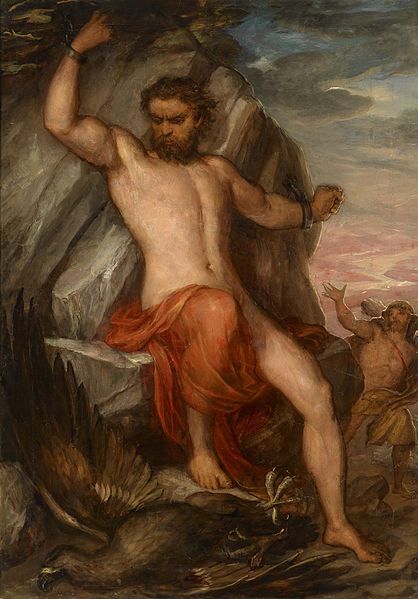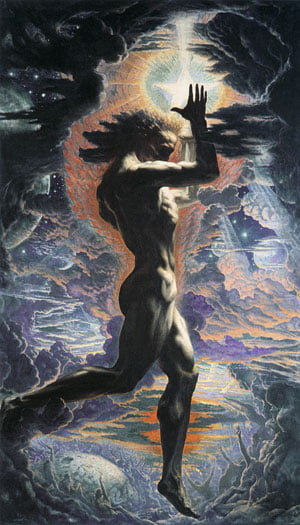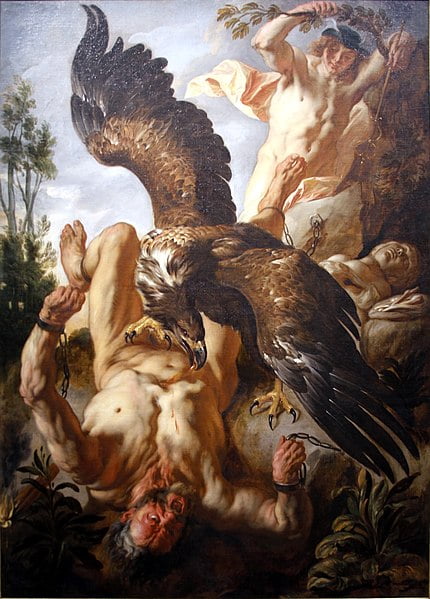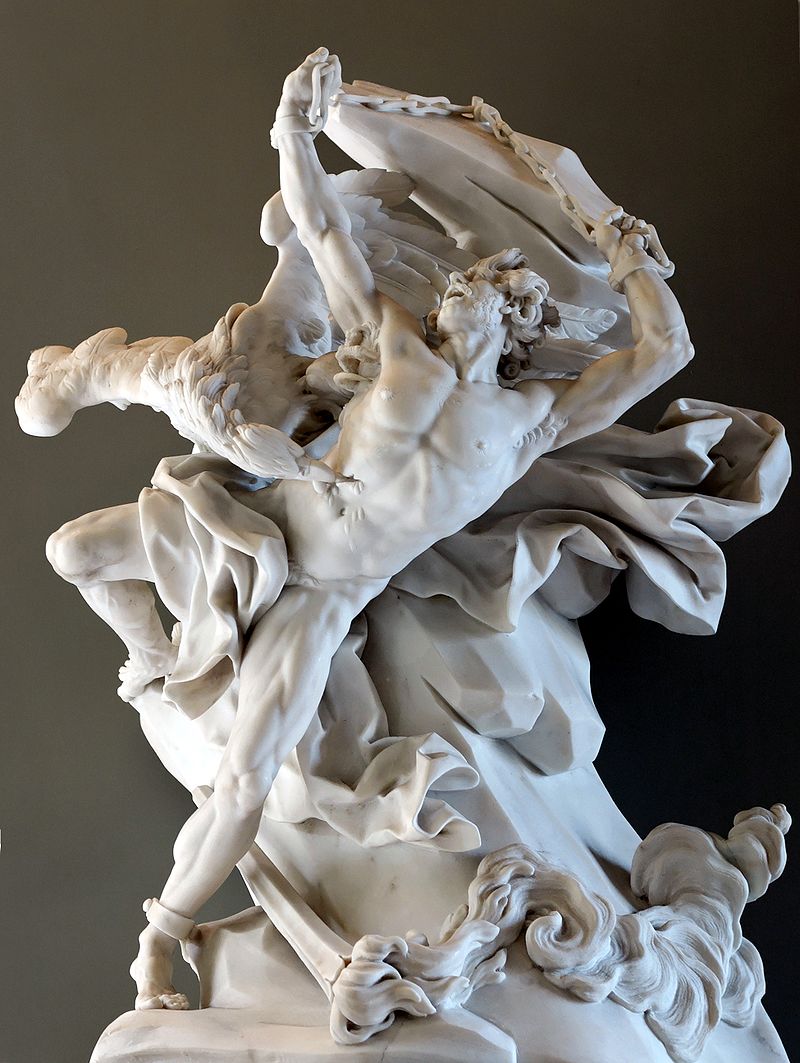Titan Prometheus

Prometheus “forethought” is a Titan known for his wily Intelligence, who stole fire from Zeus and gave it to mortals for their use. He was then punished for his crime by Zeus. Prometheus is credited with (or blamed for) playing a pivotal role in the early history of humankind.
Prometheus is a son of the Titan Iapetus by Themis, one of the Oceanids. As a son of Iapetus he was also a brother of Atlas, Menoetius and Epimetheus. Prometheus is a lowly challenger to Zeus‘ omniscience and omnipotence.
At Sicyon, a sacrificial meal marking the “settling of accounts” between mortals and immortals, Prometheus played a trick against Zeus. He placed two sacrificial offerings before the Olympian: a selection of bull meat hidden inside an ox’s stomach (nourishment hidden inside a displeasing exterior), and the bull’s bones wrapped completely in “glistening fat” (something inedible hidden inside a pleasing exterior).
Zeus chose the latter, setting a precedent for future sacrifices; henceforth, humans would keep the meat for themselves and burn the bones wrapped in fat as an offering to the gods. This angered Zeus, who hid fire from humans in retribution.
Prometheus at once went to Athena with a plea for admittance to Olympus, and this she granted. On his arrival, he lighted a torch at the fiery chariot of the Sun which presently broke from it a fragment of glowing charcoal, which he thrust into the pithy hollow of a giant fennel-stalk. Then, extinguishing his torch, he stole away, and gave fire to mankind.
This further enraged Zeus, who sent Epimetheus, brother of Prometheus, Pandora, the first woman, fashioned by Hephaestus out of clay and brought to life by the four winds, with all the goddesses of Olympus assembled to adorn her. “From her is the race of women and female kind,” Hesiod writes; “of her is the deadly race and tribe of women who live amongst mortal men to their great trouble, no helpmeets in hateful poverty, but only in wealth.”
Prometheus, in eternal punishment, is chained to a rock in the Caucasus, where his liver is eaten daily by an eagle or vulture, only to be regenerated, due to his immortality, by night . Years later the Greek hero Heracles would shoot the vulture and free Prometheus from his chains.
Here, the poet expands upon Zeus‘ reaction to the theft of fire. Not only does Zeus withhold fire from men, but “the means of life,” as well (42). Had Prometheus not provoked Zeus‘ wrath (44-47), “you would easily do work enough in a day to supply you for a full year even without working; soon would you put away your rudder over the smoke, and the fields worked by ox and sturdy mule would run to waste.”
Hesiod also expands upon the Theogony’s story of the first woman, now explicitly called Pandora. After Prometheus’ theft of fire, Zeus sent Pandora to Prometheus’ brother Epimetheus. Pandora carried a jar with her, from which she released (91-92) “evils, harsh pain and troublesome diseases which give men death.”
Aeschylus

Perhaps the most famous treatment of the Prometheus myth can be found in the Greek tragedy Prometheus Bound — traditionally (but uncertainly) attributed to the 5th-century BC Greek tragedian Aeschylus. The drama is likely the first play of the otherwise non-extant Prometheia trilogy. At the center of the drama are Prometheus’ theft of fire and his subsequent punishment by Zeus; in this, Aeschylus’ dependence on the Hesiodic source material is clear.
The Prometheus Bound also includes, however, a number of changes to the received tradition. Some of these changes are rather minor. For instance, rather than being the son of Iapetus and Clymene — and hence, Zeus‘ cousin — Prometheus becomes the son of Gaea — and Zeus‘ uncle. Also, the chorus makes a passing reference to Prometheus’ wife Hesione.
Before his theft of fire, Prometheus played a decisive role in the Titanomachy, securing victory for Zeus and the other Olympians. Zeus‘s torture of Prometheus thus becomes a particularly harsh betrayal. The scope and character of Prometheus’ transgressions against Zeus are also widened. In addition to giving humankind fire,
Prometheus claims to have taught them the arts of civilization, such as writing, mathematics, agriculture, medicine, and science. The Titan’s greatest benefaction for humankind seems to have been saving them from complete destruction. In an apparent twist on the myth of the so-called Five Ages of Man found in Hesiod’s Works and Days (wherein Cronus and, later, Zeus created and destroyed five successive races of mortal men),
Prometheus asserts that Zeus had wanted to obliterate the human race, but that he somehow stopped him. Moreover, Aeschylus anachronistically and artificially injects Io, another victim of Zeus‘ violence and ancestor of Heracles, into Prometheus’ story.
Finally, just as Aeschylus gave Prometheus a key role in bringing Zeus to power, he also attributed to him secret knowledge that could lead to Zeus‘ downfall: Prometheus had been told by his mother Gaea of a potential marriage that would produce a son who would overthrow Zeus. Fragmentary evidence indicates that Heracles, as in Hesiod, frees the Titan in the trilogy’s second play, Prometheus Unbound. It is apparently not until Prometheus reveals this secret of Zeus‘ potential downfall that the two reconcile in the final play, Prometheus the Fire-Bringer.
Originally Posted by oz of the En World forums.
Titan, Greater, Prometheus

Colossal outsider (Extraplanar, Good)
Hit Dice 48d8+816 (1,032 hp)
Initiative +15
Speed 40 ft (8 squares), fly 60 ft (perfect)
Armor Class 55 (-8 size, +7 Dexterity, +32 natural, +14 insight), touch 23, flat-footed 48
Base Attack/Grapple +48/+81
Attack Slam +58 melee (4d8+18)
Full Attack 2 slams +58 melee (4d8+18)
Space/Reach 30 ft/30 ft
Special Attacks Spell-like abilities, spells
Special Qualities Clay of creation, damage reduction 20/epic, Darkvision 240 ft, improved evasion, improved uncanny dodge, inspire competence, regeneration 5, Spell Resistance 36, wild empathy, woodland stride
Saves Fort +47 Ref +33 Will +44
Abilities Strength 47 Dexterity 24 Constitution 45 Intelligence 40 Wisdom 38 Charisma 35
Skills Appraise +57, Balance +30, Bluff +39, Climb +48, Concentration +60, Craft (alchemy) +50, Craft (sculpting) +83, Decipher Script +60, Diplomacy +68, Disguise +12 (+14 in character), Gather Information +54, Heal +56, Intimidate +14, Jump +52, Knowledge (Arcana) +70, Knowledge (Geography) +55, Knowledge (history) +60, Knowledge (local) +65, Knowledge (nature) +55, Knowledge (nobility and royalty) +50, Knowledge (religion) +55, Knowledge (the planes) +55, Listen +51, Perform (oratory) +57, Perform (sing) +47, Perform (string instruments) +52, Search +50, Sense Motive +71, Spellcraft +72 (+74 scrolls), Spot +51, Survival +14 (+16 on other planes, +16 following tracks, +16 keep from getting lost, +16 aboveground), Use Magic Device +54 (+58 scrolls)
Feats Alertness, Combat Expertise, Craft Wondrous Item, Diligent, Improved Initiative, Magical Aptitude, Negotiator, Scribe Scroll (B), Skill Focus (Craft [sculpting]), Quicken Spell-Like Ability (greater teleport), Quicken Spell-Like Ability (True Strike) Epic Feats Craft Epic Wondrous Item, Epic Skill Focus (Craft [sculpting]), Epic Fortitude, Epic Will, Group Inspiration, Improved Darkvision, Superior Initiative
Environment Olympian Glades of Arborea
Organization Solitary
Challenge Rating 32
Treasure Double coins, double goods, triple items
Alignment Always neutral good
Advancement —
Level Adjustment —
This colossal humanoid bears a wise, regal countenance. He dresses finely, and commands respect with his very gaze.
Prometheus is a wise titan, whose name means “forethought.” He is the son of the Titan Iapetus and the nymph Clymene, and is the brother of the Titans Atlas and Epimetheus. He had no wife, but he had taken as a lover Celaeno, one of the Pleiades (or Seven Sisters), and had a son named Deucalion.
When the Olympian gods and the Titans made war on each other, Prometheus was able to correctly deduce the outcome of the struggle. He was wise enough to ally himself with the gods rather than fight alongside the doomed Titans.
He is credited with creating the first humans, fashioning them out of clay. He is a helpful being, and chooses to assist humankind whenever possible. Prometheus taught humans many of the civilized arts, including the medicinal use of plants, the cultivation of grains, and the domestication of animals.
However, when he stole a flame from the sun to give humankind the gift of fire, he offended Zeus. Zeus ordered that Prometheus be chained to a mountain, to have his perpetually regenerating liver torn out every day by a griffon. After thirty years of this torture, Zeus relented and ordered Hercules to free the Titan. Prometheus was invited to join with the gods, and now dwells among them in the realm of Olympus.
Humans sometimes worship him, and he has a small but growing cult. His followers wear an iron ring set with a chip of stone from the mountain where Prometheus was chained. Prometheus has the ability to create any mortal creature from clay, to use as a servant for a time or to reward a faithful follower with a companion creature. Prometheus uses a torch as his symbol, to represent the fire he stole from the sun.
Prometheus is 100 feet tall and weighs 725,000 pounds.
COMBAT

Prometheus is a kind-hearted being, and is not wantonly destructive like most of the other Titans. He prefers to think a problem through rather than resort to force. However, he will always defend himself or any good being. He is loyal to both of his brothers, even though Atlas is evil, and will side with them if they are under attack.
Spell-Like Abilities: At will – chain lightning (DC 28), charm monster (DC 26), cure critical wounds (DC 26), daylight, fire storm (DC 30), greater dispel magic, Hold monster (DC 27), holy smite (DC 26), invisibility, Invisibility Purge, levitate, persistent image (DC 27), polymorph (humanoid forms only, duration 1 hour), produce flame, protection from energy, pyrotechnics (DC 24), read magic, remove curse (DC 26), True Strike;
3/day – etherealness, freedom of movement, greater teleport, summon nature’s ally IX;
1/day – Foresight, gate, greater restoration, maze, meteor swarm (DC 31), moment of prescience, plane shift, wind walk.
Caster level 25th. The save DCs are Charisma-based.
Spells: Prometheus can cast divine spells as a 13th-level cleric. Prometheus has access to the following domains: Good, Fire, Knowledge, and Protection. The save DCs are Wisdom-based.
Typical Cleric Spells Prepared (6/10/10/8/8/7/6/4; save DC 24 + spell level):
- 0 – Create Water, detect magic, light, mending, Purify Food and Drink, read magic;
- 1st – bless (x2), Bless Water, burning hands*, detect evil, divine favor, Entropic Shield, protection from evil, remove fear, Sanctuary, shield of faith;
- 2nd – Aid, Augury, bear’s endurance, bull’s strength, eagle’s splendor, Make whole, owl’s wisdom, produce flame*, shield other, silence, status;
- 3rd – clairaudience/clairvoyance*, continual flame, daylight, helping hand, locate object, prayer, searing light, stone shape, water walk;
- 4th – air walk, death ward, dimensional anchor, dismissal, divination, freedom of movement, holy smite*, sending, tongues;
- 5th – commune, Dispel Evil, fire shield*, flame strike, mass cure light wounds, plane shift, scrying, true seeing;
- 6th – Banishment, blade barrier*, greater dispel magic, heal, Heroes’ Feast, mass cure moderate wounds, wind walk;
- 7th – fire storm*, Holy word, mass cure critical wounds, regenerate, resurrection.
*Domain spell.
Prometheus can also cast arcane spells as a 15th-level wizard. He has access to the following spells:
- 0 – acid splash, arcane mark, dancing lights, daze, Detect Magic, Detect Poison, disrupt undead, flare, ghost sound, light, mage hand, mending, message, open/close, prestidigitation, ray of frost, read magic, resistance, touch of fatigue;
- 1st – alarm, burning hands, Detect Undead, Feather fall, hypnotism, identify, magic missile, obscuring mist, ray of enfeeblement;
- 2nd – bear’s endurance, continual flame, detect thoughts, flaming sphere, fox’s cunning, glitterdust, Mirror Image, owl’s wisdom, protection from arrows, scorching ray, see invisibility, shatter, hideous laughter, touch of idiocy, web;
- 3rd – Blink , clairaudience/clairvoyance, deep slumber, displacement, fireball, gaseous form, halt undead, haste, magic circle against evil, nondetection, suggestion, tongues;
- 4th – fire shield, locate creature, mass enlarge person, mass reduce person, shout, solid fog, stoneskin, wall of fire;
- 5th – baleful polymorph, break enchantment, dominate person, dream, feeblemind, permanency, Wall of Force;
- 6th – antimagic field, contingency, disintegrate, geas/quest, greater heroism, mass bull’s strength, mass suggestion, mislead, true seeing;
- 7th – banishment, delayed blast fireball, greater arcane sight, Greater Scrying, greater teleport, insanity, limited wish, spell turning, vision;
- 8th – grasping hand, discern location, incendiary cloud, irresistible dance, protection from spells, Summon monster VIII, sunburst.
The save DCs are Intelligence-based.
Image of the digital sculpture “Prometheus Bound” by artist Scott Eaton.
Typical Wizard Spells Prepared (4/8/8/8/7/7/6/5/3; save DC 25 + spell level);
- 0 – disrupt undead, ghost sound, mending, prestidigitation;
- 1st – burning hands, Feather fall, hypnotism, identify, magic missile (x2), obscuring mist, ray of enfeeblement;
- 2nd – continual flame, detect thoughts, Mirror Image, owl’s wisdom (x2), protection from arrows, see invisibility, hideous laughter;
- 3rd – Blink , clairaudience/clairvoyance, deep slumber, fireball, gaseous form, magic circle against evil, nondetection, tongues;
- 4th – fire shield, locate creature, mass enlarge person, mass reduce person, shout, solid fog, stoneskin;
- 5th – baleful polymorph, break enchantment, dominate person, dream, feeblemind, permanency, Wall of Force;
- 6th – antimagic field, disintegrate, greater heroism, mass bull’s strength, mislead, true seeing;
- 7th – banishment, greater arcane sight, greater teleport, insanity, spell turning;
- 8th – grasping hand, discern location, protection from spells.
Clay of Creation (Su): At will, as a full-round action, Prometheus can shape clay into the form of any living non-unique creature that is not of extraplanar origin. The sculpture becomes a living creature with average statistics for its type. This creature will serve him until it dies, though Prometheus usually sets it free after a specific service. Prometheus may also set the creature to be a companion for another being of his choosing.
Prometheus can control only 50 HD worth of such creatures at a given time. If he exceeds this number, all the newly created creatures fall under his control, and any excess creatures from previous castings become uncontrolled. (Prometheus chooses which creatures are released.)
Improved Evasion (Ex): If Prometheus makes a successful Reflex saving throw against an attack that normally deals half damage on a successful save, he instead takes no damage, and takes only half damage on a failed save. If helpless, Prometheus does not gain the benefit of improved evasion.
Improved Uncanny Dodge (Ex): Prometheus retains his Dexterity bonus to AC when flat-footed, and he cannot be flanked except by a rogue of at least 52nd level. He can flank characters with the uncanny dodge ability as if he were a 48th-level rogue.
Inspire Competence (Su): Prometheus can use any of his Perform skills to help an ally succeed at a task. The ally must be within 30 feet and able to see and hear Prometheus. Prometheus must also be able to see the ally.
The ally gets a +2 competence bonus on skill checks with a particular skill as long as he or she continues to hear Prometheus’ performance. Certain uses of this ability are infeasible. The effect lasts as long as Prometheus concentrates, up to a maximum of 2 minutes. Prometheus can’t inspire competence in himself. Inspire competence is a mind-affecting ability.
Regeneration (Ex): Prometheus takes damage from epic evil-aligned weapons and from spells and effects with the evil descriptor.
Wild Empathy (Ex): This power works like the druid’s wild empathy class feature. Prometheus adds a +30 competence bonus and his Charisma modifier (+12) to the 1d20 roll to determine the wild empathy check result.
Woodland Stride (Ex): Prometheus may move through any sort of undergrowth (such as natural thorns, briars, overgrown areas, and similar terrain) at his normal speed and without taking damage or suffering any other impairment. However, thorns, briars, and overgrown areas that have been magically manipulated to impede motion still affect him.
Originally found in the first edition Deities and Demigods (1980, James M. Ward and Robert J. Kuntz).

 Buy me a coffee
Buy me a coffee